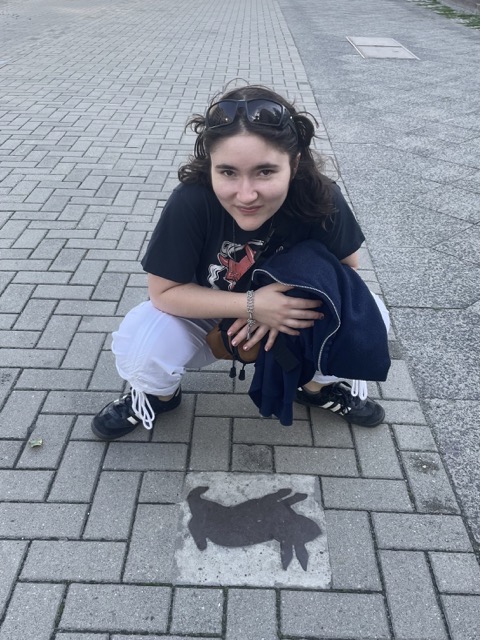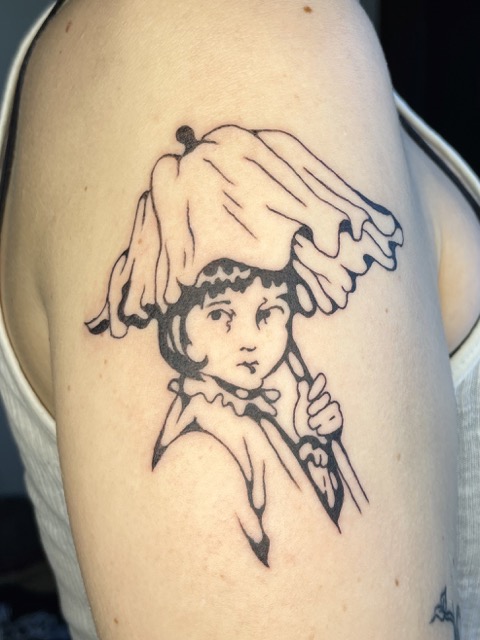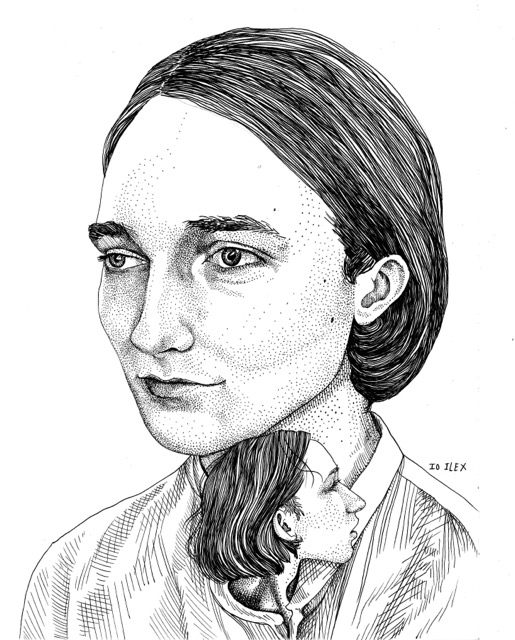
c/o Io Perl-Strahan
You have probably seen the ink-based drawings of Io Perl-Strahan ’24 showcased at a campus tabling event or displayed on the bicep of a classmate. Known for her unique drawing style, Perl-Strahan has made a name for herself as a tattoo artist and ink-master on campus. But beyond her tattoo practice, she has also helped build spaces for mindfulness, allowing students to come together to understand new ways of being. In her final semester at the University, Perl-Strahan is finishing her academic journey with a project combining her passion for body modification with her interest in ethnographic research, moving beyond the written word to engage with alternative mediums. This week, she sat down with The Argus to talk about her time at the University, letting us in on her senior project and describing how she got into tattooing.
The Argus: What made you decide to major in Anthropology?
Io Perl-Strahan: I’ve [always been] so interested in culture and people. And my Intro Sociology and Anthropology classes both made me be like, ‘whoa, everything is constructed’—that kind of moment that people have when they enter liberal arts school. I chose Anthro, specifically, because it allowed for a lot of experimentation with writing style.
A: You took a gap year?
IPS: Yes.
A: Did you know by then that you wanted to take the Anthro path?
IPS: Yeah, kind of. [During] my year off, I got the chance to apprentice at a tattoo shop in New York. And so I was kind of like, what if I sort of started thinking about these other spaces that I was in, in the real world, through the lens of my anthro-social science-y perspective?
A: What was it like apprenticing at a tattoo shop? As an 18/19-year-old?
IPS: I did not want to do remote school. So COVID hit, and I was like, goodbye. It was a great experience. I mean, it was kind of my introduction to the real world. It was super meaningful. I didn’t really learn to tattoo for the first eight months or so. I was sweeping the floor and whatnot. I had some really amazing mentors. One of them, Sam Park, actually offered me her own skin to learn on. We did a tattoo trade, which taught me so much more than I could have learned in a year of practicing otherwise, because she was able to tell me, ‘I can tell by the way that feels that you’re not going deep enough’—all this super nuanced feedback that was incredibly helpful.
But I feel like working at the shop taught me more about interacting with people than it did about tattooing. Because it’s such a vulnerable thing, getting tattooed, and trusting someone to hurt you is crazy. I’m so grateful that I was able to see that dynamic play out before I ever did it myself. Also being professional and being hygienic—it is an invasive procedure. I’m really grateful that I got to learn from pros.
A: What made you interested in tattooing?
IPS: I’ve been obsessed with it since I was a kid. I’ve always been attracted to extremes and pushing physical limits. I’ve always preferred to work in pen versus pencil, and I like the idea of committing to [your] line and putting your physicality on a piece of paper unmediated by anything. Tattooing, I sometimes say, is like the extreme sport of drawing. There’s nothing in between you and this image.
I grew up watching Ink Master. I honestly hate that show now, but I feel like it gave me a certain aesthetic interest in the craft. I started doing stick-and-pokes in high school, and that was really fun.

c/o Io Perl-Strahan
A: What was your first tattoo? What was the first tattoo that you ever gave?
IPS: The first tattoo I ever got was actually as soon as I turned 18, which was a very rash decision for an 18-year-old because it’s pretty large and it’s on my bicep. My dad was actually super supportive. He was like, ‘yeah, if you’re gonna do it, you know, do it big.’ And he paid for it, which was really sweet. It was just this artist Kevin Alexander that I’ve been following on Instagram for a while and it was a really fun experience. [It] definitely made me crave more [tattoos] because as soon as you get one tattoo, the rest of your body is negative space.
The first one I ever did with a machine is also on me. It’s this topless bodybuilder rabbit woman on my calf. And that was a really amazing experience. It was in the shop [with] one of my mentors watching. Realizing that you’ve done something so permanent is like, ‘oh, my God, I can’t stop now.’ And also, this really hurts. I don’t know if I can continue. But I have to continue, and toeing that line is impossible—like, I physically don’t know if I can do this, but I have to do it. It was a really big learning experience. Tattooing yourself is, as you know, so fun [and] so weird, because it’s like your body is kind of combating itself. Your pain response is go away, stop, retreat, but your hand is like go deeper, make it last. I am so interested in that feeling and that dynamic.
A: Being able to tattoo yourself with a machine is so impressive. The tattoos that I’ve given myself are all hand-poked. Do you think that what you study at Wesleyan informs your tattoo practice?
IPS: This year, I’ve really started to find a crossover because of my thesis, for which I’m using a lot of artistic methods, like ethnographic art type.
I think there’s a lot of overlap between ethnography in general and doing in-person fieldwork and tattooing or being in a space of body modification, just because it’s such an intense, interpersonal experience. It’s just one body changing another. One reason I’m really grateful for Wesleyan’s interdisciplinary approach is that I didn’t come into college expecting to make art or knowing in what way I would be making art here. But I’ve wound up doing it just because I felt like I had to, because I felt like I needed to use all the tools at my disposal for my anthropological practice.
That has been film and drawing at this point. [Alongside my thesis,] I’ve been making a film […] out of my fieldwork over the summer. I’ve also been drawing as part of my ethnographic method for a few years now, just as a way to get closer to my subjects and directly engage with something without anything in the way. I feel like words can delude and lead us astray a lot. I think anthropology is so special because it leans into what words cannot do. I’m really excited that my professors and courses have let me make art [in an academic setting].
A: I feel like with ethnographic work, there’s this vulnerable exchange that I think is very related to this practice of body modification and tattooing, because there is this level of trust and relationship that you really have to establish, even if it’s someone that you’re just tattooing and don’t even know.
You told me a little bit about your senior project and how you’re exploring human suspension. Can you talk a little bit more about the ethnographic work you’ve done?
IPS: My thesis is on body suspension, or human suspension, which is the practice of temporarily piercing hooks to the skin and hanging from them. It also encompasses other practices, [like] what’s called energy pulls, where two people are connected by hooks and are pulling on one another.
I’m super grateful to have gotten a grant from the Anthropology Department to do research over the summer. They don’t really tell you, but the Anthropology Department has built-in grant money for senior thesis research, which is amazing, I highly recommend to all people to declare that. So I got to go to two tattoo conventions over the summer, which is the most accessible place to watch suspension in the US. And I also got to go to a private meetup at this church outside Flint, Mich., called the Church of Suspension, that this crew bought specifically for the purpose of suspending, and which was an insane experience, with crosses [and] crucified Jesus all over the walls, really playing with the aesthetics of that and in such an insane way. It was an amazing experience. I was super nervous beforehand, because I just did not know what to expect. One of my subjects put it really well.
He was like, ‘These people look like they sacrifice goats for fun, but then you meet them and they’re, like, the most sweet supportive people ever.’ And that was definitely my experience. Being able to witness something so confounding and personal was crazy, something that no one can put into words. [That’s] a major thing that I’m contending with throughout my thesis process. Just the fact that no one can tell me how it feels to be suspended. And the ways that people do put it into words are so interesting. But it is something that really exceeds language, which is why I’ve had to look to creative means outside of the word. I’ve also made really amazing friendships through this research and met people I never thought I would. [I] have [also] really gotten past being like, ‘I don’t know you [but] I flew across the country to meet you. Like, what’s up?’ [It’s] really pushed me out of my shyness in a really freeing way.
[Witnessing suspension] is like coming up against this really embodied sense of difference, like, ‘Oh, these people will do this thing that I would never, ever, ever do.’ Trying to understand why they do it is getting close to this root difference in a really interesting way, but I am conscious of that.
A: Do you want to talk about your experience tattooing on campus?
IPS: I’ve actually been tattooing my entire time at Wesleyan. I was doing stick and pokes my freshman year, but I’ve gotten more serious about it after I apprenticed. This year I haven’t been able to work with as many people as I would have liked, just because I’m so busy with my thesis, but the past couple years, I was running two to three pieces a week, which was really, really fun.
One of the best things about it is meeting strangers, having this opportunity to spend time with someone that I never would have had such an intimate connection with otherwise. It’s really fun to see my work around campus, you know, especially when it gets warmer and people shed layers. I really appreciate how people are just down to collaborate and work together on things. I really like doing custom pieces with people, especially when there’s an interesting story involved. I’m going to miss it a lot.
A: Do you see yourself continuing that practice after Wesleyan, or do you really want to focus on that, like, anthropology sort of ethnographic fieldwork?
IPS: I’m not sure exactly what my practice is going to look like once I graduate. I don’t see myself doing it full time. But I definitely don’t want to stop ever, or at least in the foreseeable future. I think that your first stretch of time post-grad is this very vulnerable, kind of strange, fun time where you can try things out without being committed to anything just yet. So I am hoping to go in a couple of different directions.
A: What has been one of your favorite memories at Wes? Is there a fun activity that you have gotten involved with?
IPS: I run WesSangha, the meditation club here, with my friends, Julie Wise ’24 and Nate Uberuaga ’25. I definitely recommend that. I started meditating with my friend Sydney Slavitt ’23 during my sophomore year. She was running the club at the time. And we would sit early in the morning a lot. She really introduced me to this whole model of being, and she’s someone who’s so dedicated to her practice and was still living a college life. That was really inspiring, to just see that there are all these different ways of existing in the world. And she now works for Dharma Gates, which is this nonprofit that was founded by a Wesleyan alum that connects young people to free meditation retreats. It’s really cool. Highly recommend that as well.
There are also other meditation groups on campus. Hyacinth Tauriac ’25 runs a POC mindfulness group, [Visiting Assistant Professor of Art] Scott Kessel holds different events for students, and then there’s this professor [History Department Chair] William Johnston who holds morning meditations too. There is a lot going on for people interested in that realm. WesSangha meets Thursdays 4:30-5:30 in the meditation room in the basement of Memorial Chapel.

c/o Io Perl-Strahan
A: Going back to your time at Wesleyan, what has been your favorite place that you have lived in your time at Wes?
IPS: Definitely my house right now. It has totally changed the game. I’m living with amazing friends. We cook dinner every night in our almost impractically massive kitchen. It’s just so nice to have a little piece of domestic bliss to come home to. But I’ve also lived in WestCo, my freshman year; and then Lotus House; and then Eclectic. Each place has its own charm. It’s been fun to get different pieces of community around campus throughout my time here.
A: What has it been like being in Eclectic?
IPS: I rushed my sophomore year. It’s an amazing space. I love how it attracts so many creative people and people who really want to build things together. I really love being involved with this thing with its own traditions and legacy. Emma Steckline ’24 has done a lot of archival work for her senior capstone. It’s so exciting to see all these generations of weird cool people who have come before you and feel this sort of connection to them that isn’t really real—but it’s sort of real. My favorite Eclectic memory is Fight Night. It’s pretty amazing. Basically, the tradition used to be [that] pairs of besties or roommates would fight and just really go crazy. That is the spirit that I really wish I had seen more of, in my time at Wesleyan. But I’m glad that I got to witness that.
A: What’s your advice to your first-year self? Or first-years in general?
IPS: I mean, I had a lot of fun freshman year, but I also just bummed around with my WestCo friends the whole time. I feel like it’s so easy to just get cliquey your freshman year, and I do wish that I had branched out a little bit more and also joined clubs and gotten involved with more things on campus. Because Wesleyan is such an active campus, [and] there’s so many different groups. There’s just so much to get engaged with here compared to a lot of schools my friends have gone to. Why not try things early, even if you just go to one meeting? There was a mead brewing club my freshman year. I wish I went to that.
A: Is there anything else that you want to speak on before we end the interview about your time at Wesleyan, or anything else at all?
IPS: My favorite part of college has just been having the opportunity to get to know all these brilliant professors, and I feel super lucky to have been able to build those relationships. So, I would definitely recommend younger folks to go to office hours and be a little nerdy and really treasure those people as resources because they care about you. They can really help you make things happen and work on whatever weird project you want to do. So milk the school for all you can.
Jo Harkless can be reached at jharkless@wesleyan.edu.
Miles Urban can be reached at murban@wesleyan.edu.